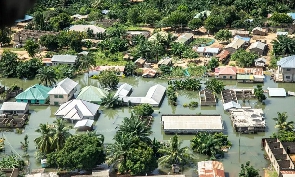Regional News of Wednesday, 25 October 2023
Source: classfmonline.com
Dam spillage: North Tongu teachers threaten to leave post for safer environments
Teachers in the North Tongu District of the Volta Region are facing grave challenges due to the ongoing spillage of the Akosombo and Kpong dams.
Many of the teachers are contemplating leaving the district for more stable environments as the spillage of the dams, have severely affected their living conditions and professional lives.
The District Chairman for the Ghana National Association of Teachers (GNAT) in North Tongu, Sammy Olando Bansah, bemoaned the plight of teachers in the district in an interview with Class 91.3 FM’s Volta Regional Correspondent, Kingsley Attitsogbui.
He indicated that many of his colleagues have not yet returned to the district after the flooding.
Mr Bansah highlighted the arduous daily journey that teachers must undertake, crossing rivers to reach their classrooms.
“I am saying that people are threatening to leave because, as we speak, some people have not come back after the flood, and now that we are not even getting any concrete information from the Volta River Authority (VRA) as to whether they will spill again or not…” he said.
Mr Bansah, therefore, called for immediate support for the affected teachers, emphasising their need for essential resources such as life jackets, accommodation, and clean drinking water.
He also stressed the challenges faced by teachers who live in areas where water sources have been polluted.
The ongoing dam spillage in the Volta Region has resulted in at least 35,995 people being displaced, according to the latest update from the National Disaster Management Organisation (NADMO).
The North Tongu District recorded the highest number of displaced individuals, totaling 12,600. This number spans 69 communities, with 4,220 people currently seeking refuge in safe havens.











